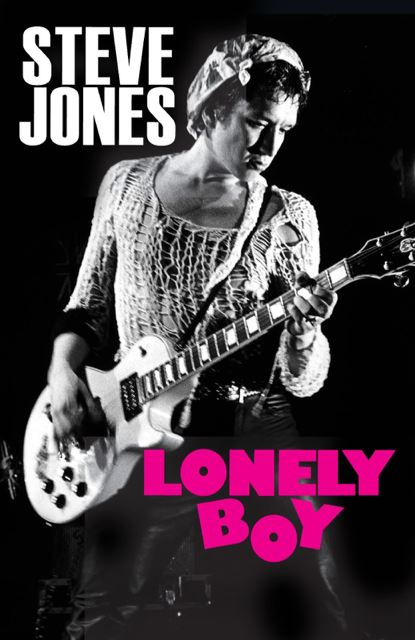 For the extent of influence the Sex Pistols had on popular culture, it’s easy to forget that the band lasted fewer than three years before imploding. Their rise was fast and loud as the punk movement they became associated with, which signified a monumental cultural shift. In his new memoir, Lonely Boy, written in collaboration with Ben Thompson, guitarist Steve Jones owns the band’s history point by point, from its grittiest details to its echoing continuance in new music. The Sex Pistols might not have a discography like the Rolling Stones or the reverberation of Bob Dylan, but they did create a legend on par with the talent, controversy, mystery and tragedy of music’s best-remembered icons.
For the extent of influence the Sex Pistols had on popular culture, it’s easy to forget that the band lasted fewer than three years before imploding. Their rise was fast and loud as the punk movement they became associated with, which signified a monumental cultural shift. In his new memoir, Lonely Boy, written in collaboration with Ben Thompson, guitarist Steve Jones owns the band’s history point by point, from its grittiest details to its echoing continuance in new music. The Sex Pistols might not have a discography like the Rolling Stones or the reverberation of Bob Dylan, but they did create a legend on par with the talent, controversy, mystery and tragedy of music’s best-remembered icons.
Lonely Boy is exciting because it’s about a Sex Pistol– singular, not plural. It isn’t a timeline detailing the band’s every move; it’s far more captivating. Given the Pistols’ reputation, perhaps it’s no surprise that Jones’ autobiography is so forthcoming. Unafraid (of seemingly everything), Jones addresses the parts of his life that most influenced his career, from his Artful Dodger alter ego to the molestation he endured as a child. Jones fought heroin and sex addiction, met his biological father for the first time in his fifties and witnessed the degeneration of personal and cultural icons like Sex Pistols manager, Malcolm McLaren, and bassist Sid Vicious. Jones realized at a young age that even the figures that loom largest– parents, friends and role models– have faults. Jones apologizes for wrongdoings throughout his book, but he doesn’t apologize for the deep-rooted curiosity that drew him into those experiences. In the midst of amused and curse-heavy recollections of destruction to the mind, body and soul lies the wisdom of a man who dared to live out loud.
The Sex Pistols story is full of extremes. When the band released its first and only album, Never Mind the Bollocks, Here’s the Sex Pistols in 1977, Jones was the oldest in the group at age 22. Vicious and Johnny Rotten were the band’s headliners, attracting media attention by protesting socially accepted traditions of living and working. McLaren acted as a diluted Colonel Parker, in control of the band’s trajectory but possessing less impact on each bandmate than Parker had on Elvis. In another band, Jones’ experiences might have made his story extreme, but with the Pistols, Jones was the hardworking musician whose skill and determination helped the band find footing in the professional music industry. In later years, that drive is what enabled him to navigate recurring inner-band conflicts, participate in reunion tours and establish a career independent of the Pistols as a radio personality. But Jones’ recollections are under no allusions about the Pistols’ masochistic tendencies. He attributes his present day lapses in memory to years of alcohol and drug use and refers frequently to the band’s infighting. Regardless, Jones credits this hard and fast way of living to the Pistols’ success. “The gaps between us were what the music sparked across,” Jones explains of the band’s early concerts. “I guess it was just never our destiny to be a normal band who make a few albums and then fade away.”
Readers should be prepared to humor Jones when they crack Lonely Boy’s cover. Jones is an entertaining storyteller, but this is his story. He has no obligation to provide exact details like dates and locations, and he often doesn’t. The Pistols rose to fame in a whirlwind of tabloid articles, venue banishments and trips down drug-laden rabbit holes, and the lack of clarity may be frustrating for readers who don’t have the Pistols’ chronology memorized. However, Lonely Boy shines when interpreted as a new chapter in the history of music and culture. Jones has wide-ranging opinions, from his view of the punk movement (“the whole ‘anyone can do it’ element of punk had completely passed us by”) to observations about the memoir writing process and his responsibilities as a public figure (“Don’t share needles, kids! Now who says this book doesn’t have a responsible public health message?”). Lonely Boy isn’t contrived or dishonest – it’s an open conversation about the experiences that were most important to Jones’ development as a musician and person. The Sex Pistols created one of music’s most memorable rebellions. This is the story of the musician who helped them make it.
-Meghan Roos







Be the first to comment!